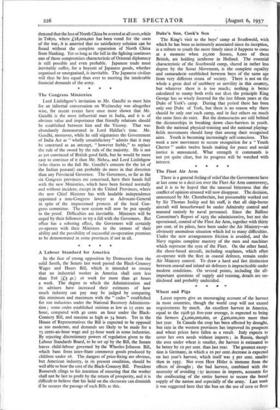A Labour Standard for America In the face of strong
opposition by Democrats from the solid South, the Senate last week passed the Black-Connery Wages and Hours Bill, which is intended to ensure that no industrial worker in America shall earn less than $16 (£3 4s.) or work for more than 4o hours a week. The degree to which the Administration and its advisers have increased their estimates of how much industry can pay may be judged by comparing this minimum and maximum with the " codes " established for too industries under the National Recovery Administra- tion ; some codes established minima as low as 15 cents an hour, compared with 40 cents an hour under the Black- Connery Bill, and maxima as high as 54 hours. Yet in the House of Representatives the Bill is expected to be opposed as too moderate, and demands are likely to be made for a 75 cents-an-hour wage and 35-hour week in some industries. By rejecting' discretionary powers of regulation given to the Labour Standards Board, to be set up by the Bill, the Senate leaves child-labour governed by.the Wheeler-Johnson Bill, which bans from inter-State commerce goods produced by children under 16. The dangers of price-fixing are obvious, but American industry, in its present condition, should be well able to bear the cost of the Black-Connery Bill. President Roosevelt clings to his intention of ensuring that the worker shall not be last to profit by the return Of prosperity, and it is difficult to believe that-his -hold on the electorate can diminish if he secures the passage of such Bills as this.






































 Previous page
Previous page